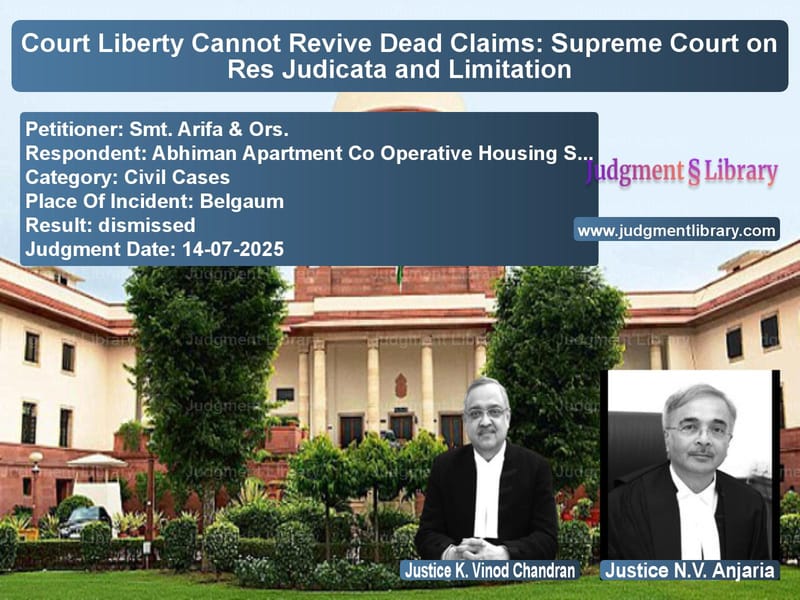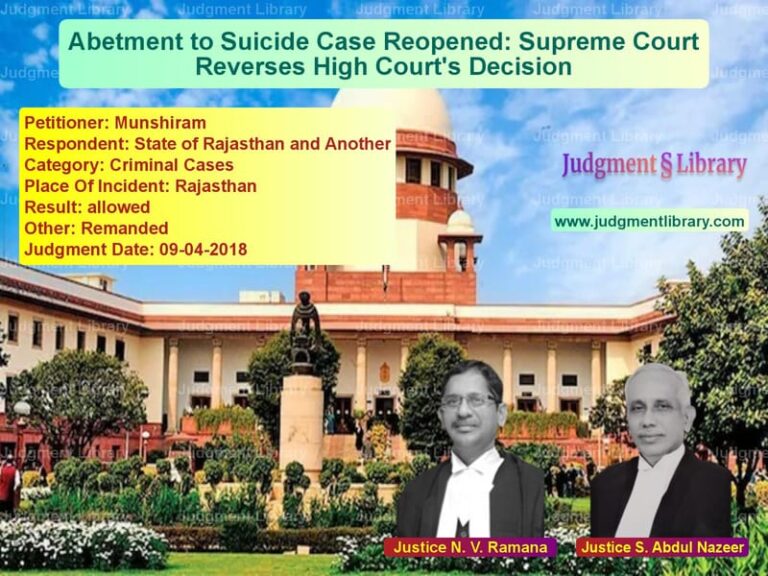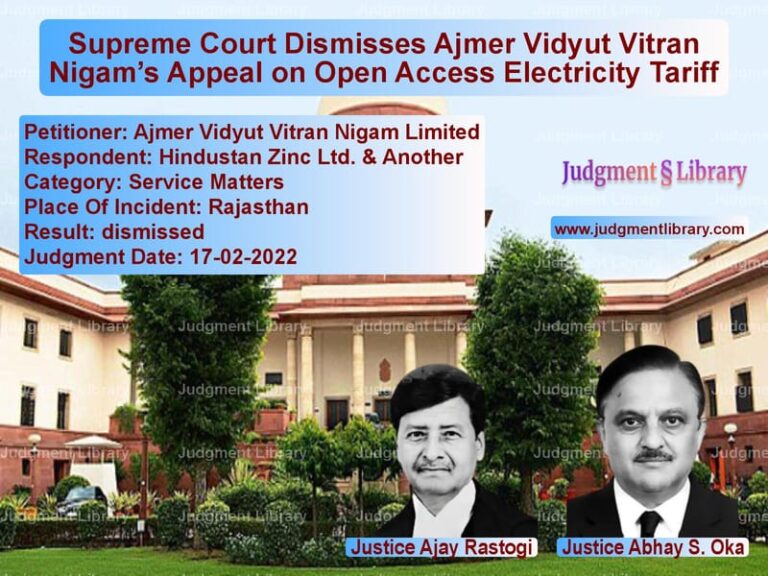Court Liberty Cannot Revive Dead Claims: Supreme Court on Res Judicata and Limitation
In a significant ruling that clarifies the boundaries of judicial discretion and the finality of court decisions, the Supreme Court has delivered a crucial judgment on the principles of res judicata and limitation in civil litigation. The case involved a complex property dispute where the petitioners attempted to resurrect a claim that had already been conclusively decided against them through multiple rounds of litigation, relying on a casual liberty granted by the High Court in a previous proceeding.
The dispute centered around a property transaction dating back to 1998, where the original plaintiff, predecessor-in-interest of the petitioners, had entered into sale agreements with a cooperative housing society. A Power of Attorney was executed in favor of the society’s secretary, which the plaintiff later claimed was obtained through coercion and misrepresentation. What followed was a legal saga spanning decades, with the plaintiff pursuing multiple legal avenues to challenge the property transfers that had occurred based on the disputed Power of Attorney.
The litigation journey began with the plaintiff filing a suit for permanent injunction against the society’s secretary, seeking to prevent alienation or construction on the property. This suit traveled through all three tiers of the judiciary – being dismissed by the trial court, confirmed by the first appellate court, then surprisingly allowed by the High Court in second appeal, only to be remanded back to the High Court by the Supreme Court. When the matter returned to the High Court, it was dismissed with a finding that no substantial question of law arose, but with a significant observation: the High Court granted liberty to file a comprehensive suit for the reliefs sought.
The Fresh Suit and Its Dismissal
Relying on this liberty, the plaintiff filed a fresh comprehensive suit seeking multiple reliefs – declaration that the sale deeds were void ab initio, declaration that subsequent sales to various defendants were illegal, recovery of possession from all defendants, and permanent injunction against interference. The trial court surprisingly decreed this suit in favor of the plaintiff, but the first appellate court set aside this judgment and dismissed the suit on three crucial grounds: res judicata, limitation, and non-joinder of necessary parties.
The appellate court found that the plaintiff was essentially re-agitating issues that had already been conclusively decided against them in the previous rounds of litigation. The core claim about the Power of Attorney being obtained through coercion and misrepresentation had been examined and rejected by three courts in the earlier proceeding. Furthermore, the suit was clearly barred by limitation as the cause of action, if any, arose when the original agreements were executed in 1998 and the sale deeds were made during the pendency of the first suit, of which the plaintiff had full knowledge.
The Supreme Court’s Analysis
The Supreme Court, in its judgment delivered by Justice K. Vinod Chandran and Justice N.V. Anjaria, conducted a thorough examination of the legal principles involved and reached conclusions that have significant implications for civil litigation practice.
On the crucial question of whether the liberty granted by the High Court could revive a time-barred claim or overcome the principle of res judicata, the Court was unequivocal. The Court powerfully observed that “the liberty granted by the High Court in the second appeal was akin to flogging a dead horse; which cannot give a fresh lease of life to either the cause of action; to save limitation or the grounds on which the declaration and consequential relief has been prayed for in the present suit; which grounds were already adjudicated in the earlier suit and found against the plaintiff by three Courts.”
This vivid analogy captures the essence of the legal principle – that no amount of judicial liberty can resurrect claims that have been conclusively decided or have become time-barred under the law of limitation.
The Principle of Res Judicata
The Supreme Court provided a clear analysis of how the principle of res judicata applied to the case. The Court noted that “The entire sub-stratum of the plaintiff’s case is built upon the alleged coercion and misrepresentation in execution of the PoA and subsequent cancellation effected, which ground does not survive having been rejected concurrently by three courts in the earlier proceeding, clearly barring the present suit on the ground of res judicata.”
The Court further explained that “The issue now agitated was substantially in issue in the earlier suit and decided against the plaintiff, bringing in the rigor of Section 11 of the Civil Procedure Code.”
This reaffirmation of the res judicata principle is crucial for maintaining the finality of litigation and preventing endless re-agitation of the same issues. The Court recognized that allowing parties to repeatedly litigate the same matters would defeat the very purpose of the judicial system and waste precious judicial resources.
The Limitation Aspect
On the question of limitation, the Supreme Court completely agreed with the High Court’s findings. The Court noted that the plaintiff’s own pleadings indicated that the cause of action arose from the date when the High Court dismissed the second appeal and granted liberty. However, the Court found this position legally untenable.
The Court emphasized that “The limitation would commence from the date of execution of the agreements, the first two of which were in the year 1998.” Despite the sale deeds being executed during the pendency of the first suit, “the plaintiff did nothing to challenge the said conveyance.”
The Court made a significant legal clarification that “No cause of action can be claimed on the liberty reserved, which is only on just exceptions including limitation, which in any event has to go by the period prescribed in the statute of limitation.”
The Court also addressed the argument about Section 14 of the Limitation Act, which provides for exclusion of time spent in bona fide proceedings in wrong courts. The Court found that “there can also be no resort to Section 14 of the Limitation Act, since the suit already laid was not before a wrong forum but was not properly framed.”
Furthermore, the Court clarified that “Even when a suit is withdrawn with leave of the Court to file a fresh suit, under Order 23 Rule 1 of the CPC limitation applies with full force as per Rule 2 of Order 23.”
Non-Joinder of Necessary Parties
The Supreme Court also affirmed the High Court’s finding regarding non-joinder of necessary parties. The Court noted that “the High Court has further observed that the suit is barred for reason of non-joinder of necessary parties, namely the Belgaum Urban Development Authority and the Badminton Association who were conceded certain extents of property for forming a lay out and civic amenities.”
This finding reinforces the importance of impleading all necessary parties in property disputes, particularly when the relief sought would affect their rights and interests.
Broader Legal Implications
This judgment serves as an important reminder about the limits of judicial discretion in granting liberties for fresh litigation. Courts cannot, through casual observations or general liberties, override substantive legal principles like res judicata and statutory limitation periods.
The Supreme Court’s ruling ensures that the finality of judicial decisions is protected against attempts to re-litigate settled matters under the guise of fresh suits filed pursuant to court liberties. It also clarifies that limitation periods continue to run independently of any liberties granted by courts, and parties cannot use such liberties to circumvent statutory time limits.
For practicing lawyers and litigants, this judgment emphasizes the importance of framing comprehensive suits at the outset and including all necessary parties and reliefs. It also highlights the critical need to be vigilant about limitation periods and to raise all available grounds in the initial litigation rather than hoping for multiple bites at the cherry through successive suits.
The Supreme Court’s firm stance in this case reinforces the foundational principles of civil jurisprudence – that there must be an end to litigation, and that statutory time limits for initiating legal action serve important public policy purposes that cannot be easily overridden by judicial observations made in different contexts.
Petitioner Name: Smt. Arifa & Ors..Respondent Name: Abhiman Apartment Co Operative Housing Society Ltd. & Ors..Judgment By: Justice K. Vinod Chandran, Justice N.V. Anjaria.Place Of Incident: Belgaum.Judgment Date: 14-07-2025.Result: dismissed.
Don’t miss out on the full details! Download the complete judgment in PDF format below and gain valuable insights instantly!
Download Judgment: smt.-arifa-&-ors.-vs-abhiman-apartment-co-supreme-court-of-india-judgment-dated-14-07-2025.pdf
Directly Download Judgment: Directly download this Judgment
See all petitions in Property Disputes
See all petitions in Judgment by K. Vinod Chandran
See all petitions in Judgment by N.V. Anjaria
See all petitions in dismissed
See all petitions in supreme court of India judgments July 2025
See all petitions in 2025 judgments
See all posts in Civil Cases Category
See all allowed petitions in Civil Cases Category
See all Dismissed petitions in Civil Cases Category
See all partially allowed petitions in Civil Cases Category







